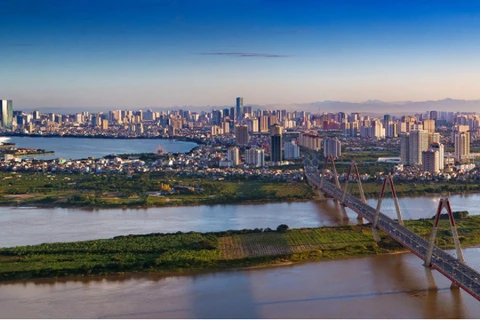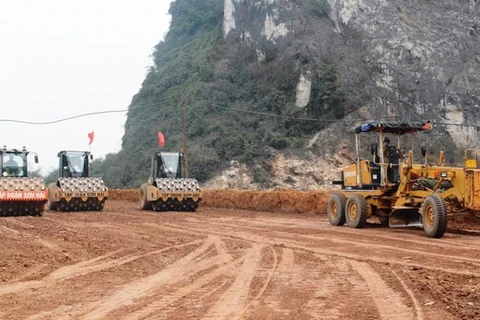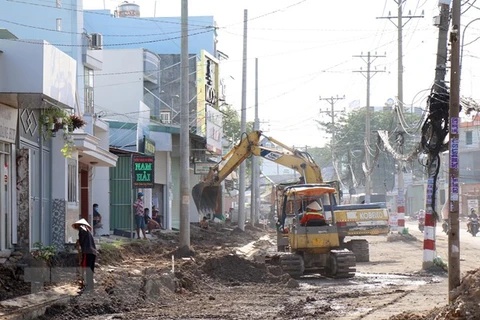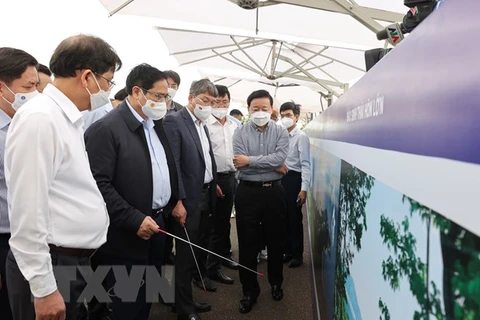Hanoi (VNS/VNA) - Nearly 18 months since the introduction of the 2021 Law on Public-Private Partnership (PPP) in Vietnam, it's still difficult to get investors to warm up to PPP projects despite the huge potential for growth, as the country ramps up efforts to build modern infrastructure, said industry experts and policymakers in a meeting in Hanoi on June 21.
The Law on Public-Private Partnership was supposed to, in theory, address three major problems endemic in Vietnam’s infrastructure projects; slow progression, overbudget and poor quality. However, according to many in the field, the law has failed to tackle a number of fundamental issues, which has discouraged and hindered investors to commit to infrastructure projects.
Dr Tran Chung, President of the Vietnam Association of Road Traffic Investors (VARSI) President, said the relationship between the State and investors, as of right now, was extremely one-sided.
Chung said PPP contracts, in essence, were agreements in which the State and investors work together to share risks, benefits and responsibilities for projects. Ideally, they should be equal partners and treated as such under the law. The 2021 Law on PPP, however, has failed to clearly define their rights and responsibilities.
"In reality, the State (or local governments acting on behalf of the State) almost always considered themselves to be regulators and investors as those to be regulated, not as equal partners," he said.
This old-school mindset was a major issue in getting investors to show interest in PPP projects.
Dr Duong Dang Hue from the Ministry of Justice, said there were instances in which local governments imposed unreasonable demands on investors that broke several laws. He said local governments or governmental offices were likely to secure far greater bargaining and decision-making power compared to investors, which ultimately hurts projects and discourages investors from joining in the future.
For example, in a number of Build-Operate-Transfer (BOT) projects under the North-South Highway Project 2017-20, the State's representative demanded investors borrow exclusively from financial institutes, which was in violation of the 2020 Law on Business that allows investors to choose how to secure capital and the 2021 Law on PPP which does not specify how investors secure capital.
"Current laws do not specify investors must raise capital exclusively from financial institutes and therefore such demand was unlawful and unacceptable," Hue said.
He called for a comprehensive review of the 2021 Law on PPP and the immediate release of a detailed guideline in the meantime to regulate the relationship between the State (and its representative bodies) and investors.
Dr Vu Tien Loc, President of the Vietnam International Arbitration Centre (VIAC), said the PPP model has been a successful one employed by many countries around the world to attract investors in building infrastructure projects. The 2021 Law on PPP, once updated, will help resolve many of investors' concerns and contribute to a trusting relationship between the State and investors.
The meeting was jointly organised by the Vietnam Chamber of Commerce and Industry (VCCI) and the United States Agency for International Development (USAID)./.
The Law on Public-Private Partnership was supposed to, in theory, address three major problems endemic in Vietnam’s infrastructure projects; slow progression, overbudget and poor quality. However, according to many in the field, the law has failed to tackle a number of fundamental issues, which has discouraged and hindered investors to commit to infrastructure projects.
Dr Tran Chung, President of the Vietnam Association of Road Traffic Investors (VARSI) President, said the relationship between the State and investors, as of right now, was extremely one-sided.
Chung said PPP contracts, in essence, were agreements in which the State and investors work together to share risks, benefits and responsibilities for projects. Ideally, they should be equal partners and treated as such under the law. The 2021 Law on PPP, however, has failed to clearly define their rights and responsibilities.
"In reality, the State (or local governments acting on behalf of the State) almost always considered themselves to be regulators and investors as those to be regulated, not as equal partners," he said.
This old-school mindset was a major issue in getting investors to show interest in PPP projects.
Dr Duong Dang Hue from the Ministry of Justice, said there were instances in which local governments imposed unreasonable demands on investors that broke several laws. He said local governments or governmental offices were likely to secure far greater bargaining and decision-making power compared to investors, which ultimately hurts projects and discourages investors from joining in the future.
For example, in a number of Build-Operate-Transfer (BOT) projects under the North-South Highway Project 2017-20, the State's representative demanded investors borrow exclusively from financial institutes, which was in violation of the 2020 Law on Business that allows investors to choose how to secure capital and the 2021 Law on PPP which does not specify how investors secure capital.
"Current laws do not specify investors must raise capital exclusively from financial institutes and therefore such demand was unlawful and unacceptable," Hue said.
He called for a comprehensive review of the 2021 Law on PPP and the immediate release of a detailed guideline in the meantime to regulate the relationship between the State (and its representative bodies) and investors.
Dr Vu Tien Loc, President of the Vietnam International Arbitration Centre (VIAC), said the PPP model has been a successful one employed by many countries around the world to attract investors in building infrastructure projects. The 2021 Law on PPP, once updated, will help resolve many of investors' concerns and contribute to a trusting relationship between the State and investors.
The meeting was jointly organised by the Vietnam Chamber of Commerce and Industry (VCCI) and the United States Agency for International Development (USAID)./.
VNA
























